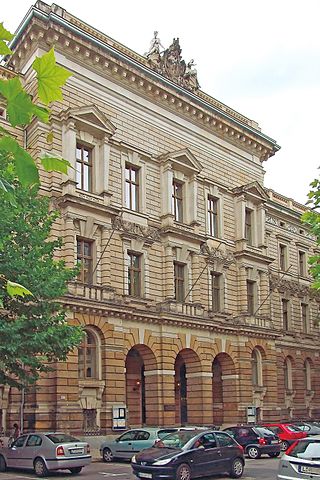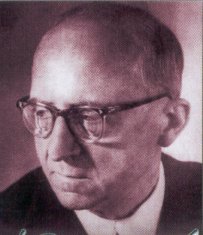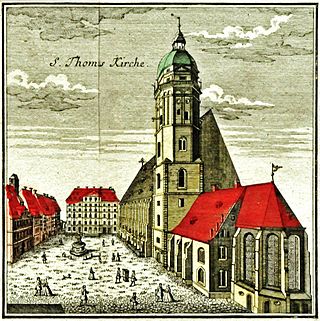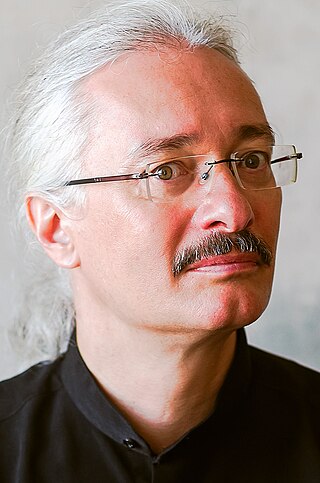
The Musische Gymnasium Leipzig was an educational institution with an artistic orientation that existed from 1941 to 1945 and led to a university entrance qualification.

The Musische Gymnasium Leipzig was an educational institution with an artistic orientation that existed from 1941 to 1945 and led to a university entrance qualification.
The Musisches Gymnasium Leipzig was housed in the Villa Gebhardt . [1] The building had been constructed in 1880/1881 by the architect Arwed Roßbach for the publishing bookseller Leopold Gebhardt, the owner of J.-M. Gebhardt's Verlag. The Jewish Gebhardt family had lost the property as part of the Aryanisation by the National Socialists. After the Second World War, the building was used for medical purposes and today, with a modern extension, is the Stadtpalais senior citizens' residential home.
Due to the bombing in Leipzig, the Musisches Gymnasium was moved to Nossen in 1944 until it was disbanded. [2]
The Musisches Gymnasium Frankfurt was founded in 1939 as the first school of its kind in Germany. The director was the later Thomaskantor Kurt Thomas. The Reich Ministry of Education in Berlin had technical supervision.
In September 1941, the second school of this kind followed in Leipzig. As in Frankfurt, the intention was to exert political influence on arts education. The opening ceremony took place on 28 September 1941 in the presence of Reich Education Minister Bernhard Rust. In the report on this in the Leipzig Yearbook 1942 [3] the Musisches Gymnasium is placed in the same category as the Adolf Hitler Schools and the National Political Institutes of Education (Napola) and ascribed the task of "educating a new class of leaders in the field of art". With "soldierly-musical" education as the school's goal, [3] the Gymnasium was an all-boys school with an attached boarding school. For the year 1942, 110 pupils in seven classes are given. [4]
The choice of Leipzig as the second school location was based on the intention of removing the Thomanerchor as far as possible from ecclesiastical influence and placing it under state control, but this was ultimately unsuccessful. [5] A first step in this direction was the appointment of Thomaskantor Günther Ramin as musical director of the school. [6] However, the headmaster became a teacher, Richter, who settled the administrative issues with the school office, bypassing Ramin.
In February 1943, Günther Ramin resigned as artistic director of the Musisches Gymnasium Leipzig due to the distribution of competences. The succession of the artistic director was not clarified almost until the dissolution of the school. Numerous composers and music teachers were approached, but they all declined, among them Hugo Distler, Walter Kolneder, Fritz Reuter, Cesar Bresgen, Karl Höller and Hans Chemin-Petit. Finally, in August 1944, Johann Nepomuk David took over alongside his directorship at the University of Music and Theatre Leipzig. [7] However, both institutions were already in alternative quarters by then.
The Musisches Gymnasium was discontinued after the end of the war. [8]

The University of Music and Theatre "Felix Mendelssohn Bartholdy" Leipzig (German: Hochschule für Musik und Theater "Felix Mendelssohn Bartholdy" Leipzig) is a public university in Leipzig, Saxony, Germany. Founded in 1843 by Felix Mendelssohn as the Conservatorium der Musik (Conservatory of Music), it is the oldest university school of music in Germany.

The Thomanerchor is a boys' choir in Leipzig, Germany. The choir was founded in 1212. The choir comprises about 90 boys from 9 to 18 years of age. The members, called Thomaner, reside in a boarding school, the Thomasalumnat and attend the St. Thomas School, Leipzig, a Gymnasium school with a linguistic profile and a focus on musical education. The younger members attend the primary school Grundschule Forum Thomanum or Anna-Magdalena-Bach-Schule. Johann Sebastian Bach served as Thomaskantor, director of the choir and church music in Leipzig, from 1723 to 1750.

St. Thomas School, Leipzig is a co-educational and public boarding school in Leipzig, Saxony, Germany. It was founded by the Augustinians in 1212 and is one of the oldest schools in the world.

Günther Werner Hans Ramin was an influential German organist, conductor, composer and pedagogue in the first half of the 20th century.

Kurt Georg Hugo Thomas was a German composer, conductor and music educator.

Georg Christoph Biller was a German choral conductor. He conducted the Thomanerchor as the sixteenth Thomaskantor since Johann Sebastian Bach from 1992 to 2015. He was also a baritone, an academic teacher, and a composer. Active as Thomaskantor after the German reunification, Biller returned the Thomanerchor to its original focus on church music. He was instrumental in the new buildings for the choir's boarding school, the Forum Thomanum, and in the celebration of its 800th anniversary in 2012.
Hans-Joachim Rotzsch was a German choral conductor, conducting the Thomanerchor from 1972 until 1991 as the fifteenth Thomaskantor since Johann Sebastian Bach. He was also a tenor and an academic teacher.

Erhard Mauersberger was a German choral conductor who conducted the Thomanerchor as the 14th Thomaskantor since Johann Sebastian Bach. He was also an academic teacher and composer.

Günter Kochan was a German composer. He studied with Boris Blacher and was a master student for composition with Hanns Eisler. From 1967 until his retirement in 1991, he worked as professor for musical composition at the Hochschule für Musik "Hanns Eisler". He taught master classes in composition at the Academy of Music and the Academy of Arts, Berlin. He was also secretary of the Music Section of the Academy of Arts from 1972 to 1974 and vice-president of the Association of Composers and Musicologists of the GDR from 1977 to 1982. Kochan is one of eleven laureates to have been awarded the National Prize of the GDR four times. In addition, he received composition prizes in the US and Eastern Europe. He became internationally known in particular for his Symphonies as well as the cantata Die Asche von Birkenau (1965) and his Music for Orchestra No. 2 (1987). His versatile oeuvre included orchestral works, chamber music, choral works, mass songs and film music and is situated between socialist realism and avant-garde.

Thomaskantor is the common name for the musical director of the Thomanerchor, now an internationally known boys' choir founded in Leipzig in 1212. The official historic title of the Thomaskantor in Latin, Cantor et Director Musices, describes the two functions of cantor and director. As the cantor, he prepared the choir for service in four Lutheran churches, Thomaskirche, Nikolaikirche, Neue Kirche and Peterskirche. As director, he organized music for city functions such as town council elections and homages. Functions related to the university took place at the Paulinerkirche. Johann Sebastian Bach was the most famous Thomaskantor, from 1723 to 1750.

Gotthold Schwarz is a German Bass-baritone and conductor. Based in Leipzig, he started as a member of the Thomanerchor and has conducted the Gewandhausorchester. Between 2016 and 2021, he was the 17th Thomaskantor after Johann Sebastian Bach.
The Bach Medal is awarded by the Lord Mayor of Leipzig during the Bachfest Leipzig in recognition of efforts to promote the work of Johann Sebastian Bach. The Bach Medal of the City of Leipzig is an annual award.
MDR Rundfunkchor is the radio choir of the German broadcaster Mitteldeutscher Rundfunk (MDR), based in Leipzig, Saxony. Dating back to 1924, the choir became the radio choir of a predecessor of the MDR in 1946, then called Kammerchor des Senders Leipzig, or Rundfunkchor Leipzig. The present name was established in 1992. The choir has appeared internationally, and has made award-winning recordings.
From 1959 to 1989, the city of Leipzig awarded the Kunstpreis der Stadt Leipzig, which was given for outstanding merits in the artistic field to persons who promoted the reputation of the city beyond the region: architects, visual artists, composers, musicians, singers, actors and writers as well as literary and art critics.
Gerda Schriever was a German contralto in oratorio and recital, and an academic teacher. She appeared for decades with the Thomanerchor in Leipzig, also recording and for broadcast. She appeared at international festivals. Schriever was an academic voice teacher at the University of Music and Theatre Leipzig.
Fritz Reuter was a German musicologist, music educator, composer and Kapellmeister. Reuter was one of the most important German music educators of the 20th century. After studying music and musicology in Dresden and Leipzig, with Teichmüller, Riemann, Schering and Abert, he received his doctorate in 1922. In 1945, he was appointed Kapellmeister at the Volksoper in Dresden. In 1949, he was appointed as the first professor of music education at a German university. He was also director of institutes at the Martin Luther University of Halle-Wittenberg and the Humboldt University Berlin. In 1955, he was one of the initiators of the first Hallische Musiktage.

Stephan König is a German composer, pianist and conductor. He is the musical director of the "LeipJAZZig-Orkester" and the chamber orchestra "artentfaltung" and is considered one of the most authoritative Jazz musicians in Leipzig.
The Musisches Gymnasium Frankfurt was an educational institution leading to a university entrance qualification within the framework of the National Socialist Education System. It was founded in 1939 as the first Musisches Gymnasium of the then Greater German Reich at Adolf Hitler's request and closed after the end of the Second World War in 1945. The school was under the direct supervision of the Reich Ministry of Science, Education and Culture, and the city of Frankfurt was the school authority. It became known under its director Kurt Thomas. In its internal constitution, the Musisches Gymnasium retained a special position within the National Socialist elite schools, for example through the performance of otherwise suppressed church musical works or the inclusion of confessional religious instruction in the timetable.
Johannes Schäfer was a German organist. He became known above all for his concerts and his work as an organ teacher.

The Forum Thomanum is a music educational campus developed from 2002 in Leipzig, Saxony, Germany, as the new home of the Thomanerchor which was founded in 1212. It was conceived in 2002 by Georg Christoph Biller, then Thomaskantor, and others, to provide an internationally oriented innovative campus for a future of the traditional choir which was defined until then by Thomaskirche and Thomasschule.